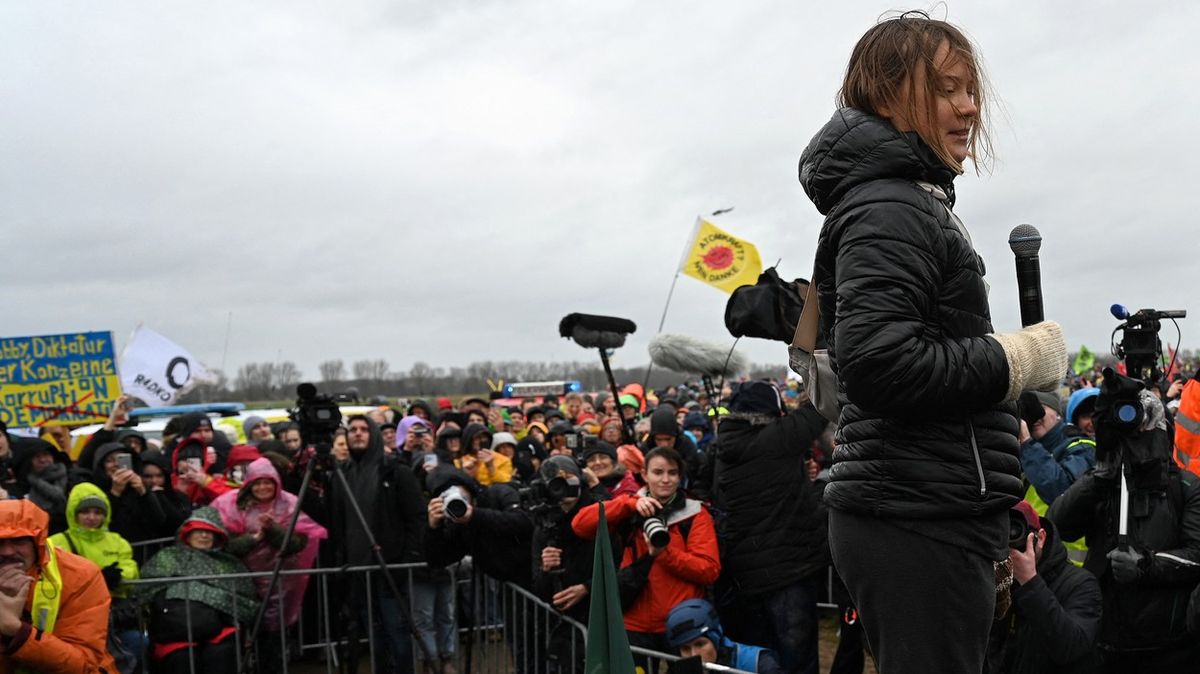Today around 10,000 people, including Swedish climate activist Greta Thunberg, are demonstrating against the demolition of the village of Lützerath in West Germany. The radio and television station WDR reports on it. Lützerath, which in recent days has become a symbol of Germany’s fight against climate change, is being demolished due to the expansion of a nearby lignite mine.
The protest started in the village of Keyenberg, about three kilometers from Lützerath, but some demonstrators left it and tried to enter the disputed village. The police, who also have water cannons at the ready, stop them from doing so. Other activists are right at the pottery mine.
The police began clearing Lutzerat, which originally had more than 400 activists, on Wednesday and was practically finished by Friday. In the afternoon, while the police were removing people from the last occupied building, the demolition of one of the farmhouses began.
Today, the demolition of the village continues amid continuous rains. At the same time, the police are trying to remove the few activists who made homes in the trees from the place. In addition, two hid in an underground tunnel.
Thunberg spoke to the main activist group in the afternoon. She told them, “As long as there is coal in the land, we will not lose the battle.” “The coal is still in the ground. And we’re still here,” she said.
Activists are trying to prevent the demolition of the village of Luzerat
Because of coal mining, the last village in Germany is disappearing. “It is interesting that politicians from the Green Party also approved of it,” says Jan Brouy of Hospodářské noviny. Climate activists defend the settlement of Lützerath despite the intervention of hundreds of police officers.
In an interview with the DPA, the 20-year-old activist criticized the German Greens, who are part of the all-German government coalition and at the state level were also behind the agreement that opened the way for the demolition of Lützerath and the expansion of the mine owned by energy company RWE. “The fact that the Greens are making concessions with such companies shows their priorities,” she said.
The Greens’ economics minister Robert Habeck, who is also in charge of climate change, didn’t show much understanding for the protesters on Friday. There are many good reasons to protest for more climate protection, he says, but Lützerath has the wrong symbol.
However, a public opinion poll by ZDF television showed that 59 percent of Germans do not want further expansion of lignite mines. 33 percent of them support.
The village of Lützerath in North Rhine-Westphalia consists of several houses and farms, in which about 80 people still lived in 2008. The original inhabitants had to move gradually so that RWE could expand the lignite mine. The endangered village quickly became a symbol of Germany’s fight against the climate crisis, and activists moved in.
It was finally decided to demolish the village last year, when the energy company RWE reached an agreement with the German government last year in exchange for expanding the mine in the west of the country, extending the operation of some coal-fired power plants, and the company promised to end coal mining by 2030.

“Alcohol scholar. Twitter lover. Zombieaholic. Hipster-friendly coffee fanatic.”


